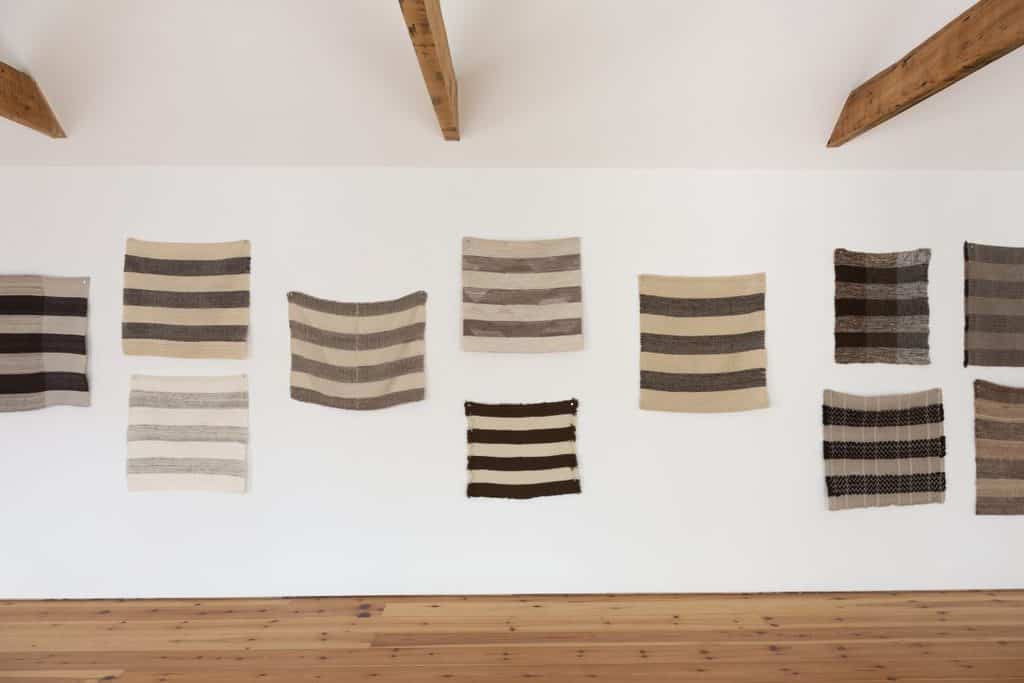American artist Helen Mirra’s exhibition Acts for placing woollen and linen exhibition is open to the public by appointment until 19 September.
Visits can be pre-booked via CAMPLE LINE’s website or by calling 01848 331000.
Appointments are available in hourly time-slots, Thursdays to Saturdays, 11am to 4pm.
The exhibition opens with the installation of Standard Incomparable – a collection of 65 weavings made by weavers from 16 countries as part of a project begun by Mirra in 2015 when she was artist in residence at Isabella Stewart Gardiner Museum in Boston. A project of international scope, it was initiated by Mirra with an open call, appearing in twenty-three languages, for simple weavings with a particular set of qualities:
‘a more or less square, plain-woven piece, of a width matching the length of the weaver’s arm. Yarn of local & undyed plant and/or animal material, in seven alternating stripes (of shades or weights) the width of the weaver’s hand (incl. the thumb).’
Of these qualities, Mirra has said: ‘while weaving, it seems one can’t help but be aware of one’s arms, one’s hands, their size – as one is really “with them” when with a loom.’
Installed in its entirety for the first time since 2016, the collection of weavings reveals characteristics both general and distinct, which makes each weaving both ‘standard’ and ‘incomparable.’ Indeed, as a project Standard Incomparable is ultimately about the non-standard, the exception that can be found within the pattern or to what is apparent – longstanding interests in Mirra’s practice.
From 27 August onwards, the weavings will be taken one by one from the gallery by CAMPLE LINE’s team and a group of participants, on foot, and placed outside in the surrounding landscape where they will be left. In this way, for Mirra, ‘the collection will be let go of.’
This ‘decremental’ process will constitute Acts for placing woollen and linen, and as with the production of the weavings, it will entail individual actions within a collective undertaking. The relationship between body, material and weaving established by Standard Incomparable will be extended to include factors such as ground, field and walking.
In evolving Acts for placing woollen and linen for CAMPLE LINE, Mirra referenced two pieces of relatively short-lived 17th century legislation – the ‘Burying in Woollen Acts’, signed by Charles II into English law in 1666 and 1680, and the related ‘Act for burying in Scots Linen’, passed by the Parliament of Scotland in 1686. Additionally, Mirra has an enduring interest in bleachfields – open areas established in and around mill towns in the 17th and 18th centuries in Scotland and England as well as Europe, and used for spreading semi-finished linen cloth on the ground to be purified and whitened by the action of sunlight.
Cample Mill itself is an especially poignant location for Acts for placing woollen and linen. It operated as a spinning and weaving mill before being repurposed several times throughout the 20th century – a place itself from which weaving and all its associated activity departed.
In response to Acts for placing woollen and linen, CAMPLE LINE has commissioned new writing from 12 – a collective of women writers, who will respond to Mirra’s open call and to the weavings themselves – and from Dr David Borthwick (University of Glasgow, School of Interdisciplinary Studies), who will respond to the process of walking out a weaving. These will be shared online in September.
Alongside Acts for placing woollen and linen, a new soundwork resulting from our After John Cage project has been installed at CAMPLE LINE. Created and led by writer and John Cage specialist Victoria Miguel over spring, the new soundwork features 191 mesostic poems produced by 14 participants using John Cage’s technique of ‘writing through’ as applied to the correspondence of Thomas Carlyle and Ralph Waldo Emerson. The poems have been read in four volumes by our Gallery Assistants Lucy Dale, Penny Gonlag, Lydia McMillan and Ines Wood. A publication featuring all the mesostics will be released digitally on 5 September – John Cage’s birthday.
Over 28 – 30 August, CAMPLE LINE will also host its fourth Screening At Home – Suhaib Gasmelbari’s Talking About Trees (2019, 94mins, Sudan), which follows the efforts of four Sudanese filmmakers—Ibrahim Shaddad, Suleiman Ibrahim, Manar Al-Hilo and Altayeb Mahdi to screen a film at the defunct Revolution Cinema in Khartoum. The film will be launched with a communal screening on Friday 28 August at 6.30pm followed by a live online conversation with Shahenda Suliman.
CAMPLE LINE’s autumn exhibition will be announced shortly






